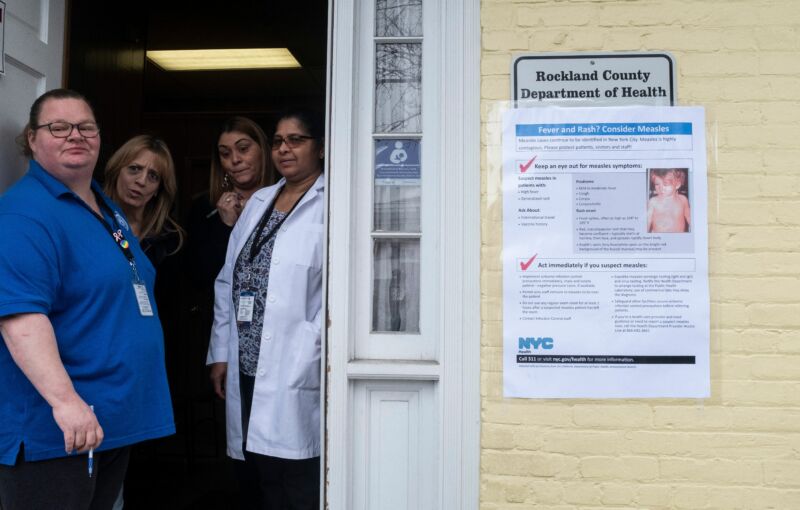
Test, isolate, trace, quarantine: these are the bedrock public health measures proven effective at stamping out an infectious disease before it flares to the point where the only option left is to foist draconian lockdowns on whole populations.
The World Health Organization and public health experts have uttered and re-uttered the strategy ad nauseam since the COVID-19 pandemic erupted in January. And health officials in many places followed the advice, quickly testing those at risk, isolating those infected, tracing people with whom patients had contact, and quarantining anyone exposed. It’s a strategy that requires leadership and resources but also public cooperation and commitment from everyone to do their part to defeat a common viral enemy for the greater good. With all of that, the strategy works. The places that followed the advice and largely stood together—Hong Kong and South Korea, for instance—are among those that have been the most successful at containing the devastating new coronavirus, SARS-CoV-2.
The United States, meanwhile, did not take the advice, and the virus has spread widely, triggering lockdowns and now re-lockdowns. So far, the US has recorded over 2.7 million cases and more than 128,000 deaths—and counting. The country has more than 25 percent of the cases globally, while only having around 4 percent of the world’s population. Still, the lesson has not sunk in.
In New York, public health officials are struggling to convince some residents to work with contact tracers as a new cluster threatens to turn into a flare-up. The Empire State was once the epicenter of the country’s still-roaring pandemic but has since seen its outbreak subside. New York is now at a point where vigilant testing, isolating, tracing, and quarantining contact can extinguish lingering embers—but only if people comply.
Not answering the call
On Wednesday, officials in Rockland County—just north of New York City—reported a cluster of cases linked to a recent party of up to 100 people largely in their early 20s. At the time of the party, the host was infected and had symptoms but held the party anyway.
So far, at least eight attendees have tested positive for the virus. But many partygoers have refused to work with public health officials to track the potential spread and notify others who may have been infected and could go on to spread the disease further.
“We are not receiving the necessary cooperation when we contact those who are positive for COVID-19 or those who have been at some of these gatherings,” Dr. Patricia Schnabel Ruppert, Rockland County’s health commissioner said at a press briefing Wednesday.
She explained:
My staff has been told that a person does not wish to, or have to, speak to my disease investigators. They hang up. They deny being at the party even though we have found their name from another party attendee or a parent provides us with the information. Many do not answer their cell phones and do not call back. Sometimes parents answer for their adult children and promise that they have been home consistently when they have not been.
This must stop.
In response, Ruppert announced that the county will issue subpoenas to anyone who refuses to cooperate with contact tracing. So far, the county is processing eight subpoenas. In addition, those who do not comply will face civil fines of around $2,000 every day they are out of compliance.
Ruppert went on to note that the young people exposed could go on to spread the virus to vulnerable people in the community, including older relatives, people with underlying health conditions, and young children who may be at risk of developing a severe inflammatory disorder. And even though young adults have relatively less risk of severe outcomes than other groups, they too could become seriously ill.
“You may wish to be invincible,” Ruppert said. “But you’re not. None of us are against this dreadful disease.”
Deadly serious
Rockland County Executive Ed Day added at the press conference that people who attended the party are not in trouble for attending. Rather, officials just want information to track the virus, and they’ll do what they need to get it.
“We are deadly serious,” Day said. “I will not allow to have the health of our county compromised because of ignorance, stupidity, or obstinance or anything else for that matter.”
Contact tracing in general has been a struggle in the US. Several cities and states have reported difficulty in contacting people and convincing them to help trace the virus. But Ruppert and Day both noted that when Rockland County faced a similar problem during an explosive measles outbreak in 2019, issuing subpoenas worked. “I expect the same now,” Ruppert said.
Ruppert and Day also noted that county officials had learned that more parties are planned for the Fourth of July, including by people who were at the party where COVID-19 was spread. To prevent this, the county will strictly enforce social-distancing measures still in place and the required isolation and quarantine orders for people infected or exposed, Day said.
For the people who were at the earlier party: “We’re asking them nicely now," Day said, "they’ll be getting subpoenas later."
Health - Latest - Google News
July 03, 2020 at 05:07AM
https://ift.tt/3eW7uPW
NY partygoers get subpoenas after stonewalling COVID-19 contact tracers - Ars Technica
Health - Latest - Google News
https://ift.tt/2zrj9Ud
Bagikan Berita Ini














0 Response to "NY partygoers get subpoenas after stonewalling COVID-19 contact tracers - Ars Technica"
Post a Comment